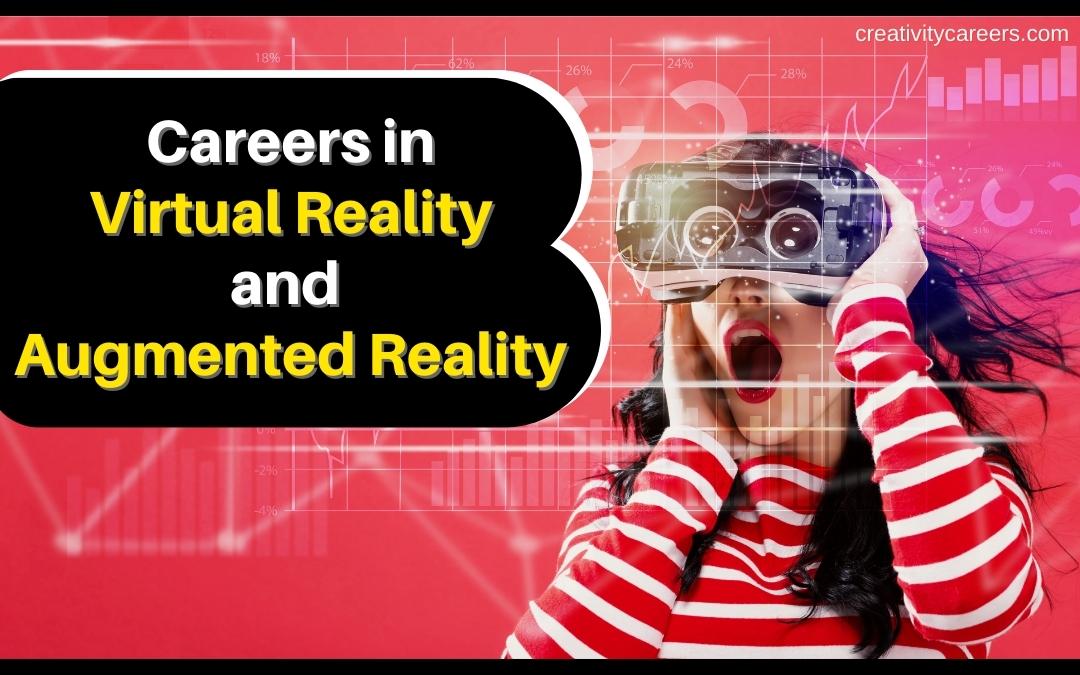Starting a career in Augmented Reality (AR) and Virtual Reality (VR) in 2022 can be your life’s greatest career decision! AR and VR are the future of the Indian Media and Entertainment Industry.
Table of Contents Index
What is Virtual Reality (VR)?
What is Augmented Reality (AR)?
Amazing career options in Augmented Reality and Career options in Virtual Reality (AR and VR)
Educational requirements to start a career in Augmented Reality and Virtual Reality
Personal Qualities to pursue AR and VR career
Skills required for Augmented Reality and Virtual Reality
Why is VR – AR a good career option?
Which are the popular industries for VR & AR professionals?
Which are the top companies for VR, AR, and Gaming professionals?
How to start a career in Virtual Reality and Augmented Reality?
How to choose a VR, AR & Gaming course?
How to Get Started with Virtual Reality and Augmented Reality?
What are some of the best AR-VR courses & colleges to attend?
Future of AR and VR in India
Careers in Virtual Reality (VR) and Augmented Reality (AR)
Virtual Reality and Augmented Reality developers are in very high demand right now. Extended reality technology began with gaming businesses, but it has now extended to other areas like education, healthcare, and the military. Due to this high demand for AR and VR designers, developers, and artists, career in Virtual Reality and career in Augmented Reality are some of the most sought after career options available right now among youths who want to pursue their career in new-age technology fields which will soon become mainstream career paths.
Virtual reality (VR) and augmented reality (AR) are two of the most exciting new technologies sweeping the globe. AR and VR are making their way into every business, from gaming and entertainment to 3D modeling and social networking.
This development has created a plethora of chances for virtual and augmented reality developers who want to be a part of some of the most cutting-edge technological developments.
So, what exactly is this futuristic industry of AR-VR? Is this a good career choice for you? If so, how can you get into AR or VR and turn it into a successful career? Here you’ll find the answers to all of your queries.
What is Augmented Reality (AR)?
Augmented reality (AR), on the other hand, is a type of virtual reality that does not completely immerse users in a virtual environment but rather enriches the actual world through the use of digitally created perceptual overlays. Unlike Virtual reality (VR), Augmented Reality (AR) technology is used in everyday devices like phones to superimpose visuals like characters on top of a camera viewer or a video.
One of the most well-known instances is Pokémon GO, in which millions of people all around the globe have been rushing about with their cellphones in pursuit of small virtual animals. The most vivid example of augmented reality is this.
Snapchat filters are another form of augmented reality, where users may project digital creations onto the real environment. You may easily download any AR software and experience this technology if you have a contemporary smartphone. However, there is another way to experience it: through the use of special headphones that show digital material on a tiny screen in front of the user’s eye.
Many people mistakenly assume that virtual reality and augmented reality are the same things, however, this is not the case. The user is immersed in a computer-generated simulation of reality in virtual reality. Starting a career in Augmented Reality (AR) right now can be the wisest decision of your life because it is highly trending and highly rewarding.
Virtual reality usually necessitates the use of a headset, such as Facebook’s Oculus Rift or Samsung’s Gear. It’s usually utilized in video games or to improve training for real-life scenarios. On the other side, augmented reality overlays computer-generated visuals over the user’s perspective of the actual world.
It is often built into mobile applications to improve a user’s engagement with reality. Both virtual reality and augmented reality are instances of extended reality.

Amazing career options in Augmented Reality and Career options in Virtual Reality (AR and VR)
A VR, AR, and gaming professional’s work description is determined by the sort of position he or she has. Below are some common virtual reality, augmented reality, and gaming job profiles.
These are some of the Career options in Virtual Reality (VR) as well as some career options on Augmented Reality.
- Software Engineer
- Software Designer
- Quality Assurance Engineer
- Product Manager
- UI & UX Design Engineer
- VR Game Engineer
- Virtual Reality Designer
- Game Developer
- AR/VR Developer
- Mixed Reality Artist
- Rigger
- VR Sound Effects Specialist
- Design Architect
How to start a career in Augmented Reality and a career in Virtual Reality?
To build a successful career in Augmented Reality or a career in Virtual Reality you need to fulfill some basic educational criteria, you must have the required skills along with personal qualities.
Please stay tuned with us on this article to know everything that is required to become a successful AR and VR developer, designer, or artist.
Educational requirements to start a career in Augmented Reality and Virtual Reality
You don’t need a formal education to get a job as a virtual reality or augmented reality developer at the entry level, but a degree in a relevant subject will give you an edge over the competitors. For entry-level virtual and augmented reality jobs, a degree in computer science or software engineering is frequently desirable or necessary. Courses in game creation, as well as mathematics and simulated physics, will equip you with a solid foundation.
Because there is no bachelor’s degree in virtual reality or augmented reality. Coding boot camps are attractive alternatives to traditional schooling. All they need is a basic understanding of how to build software that drives AR/VR experiences. When it comes to pursuing a job as a VR and AR developer, having a bachelor’s degree in computer science is advantageous.
Personal Qualities to pursue AR and VR career
It isn’t enough to have the right education and talents to be a successful virtual reality or augmented reality developer. You must have a love for your craft as well as traits that will help you perform a good job. A creator of virtual and augmented reality is:
– Innovative
– Analytical
– Problem Solver
Skills required for Augmented Reality and Virtual Reality
When it comes to working in the IT sector, most people concentrate only on their coding and software development abilities. It’s important to keep in mind that this is still a people-oriented field. Soft skills development might also help you obtain a job as Virtual reality (VR) and/ or Augmented reality (AR) developer.
Keep in mind that employers are often seeking someone who can solve problems, think logically, and communicate well with other team members.
A job in augmented reality and virtual reality is ideal for people with a passion for gaming. Candidates with technical experiences, such as those who have worked as software developers, coders, or designers, can work in this sector.
An AR, VR, and gaming professional should have the following technical skills:
- Knowledge of programming languages such as C++, JAVA, and C#
- Experience with 3D software such as 3D MAX and Autodesk 3D
- Video/sound production abilities
- Strong UI/UX skills
- Game development
The following are some of the soft skills that an AR, VR, and gaming professional should have:
- Ability to think beyond the box
Attention to detail
Adaptability to changing settings and trends
A strong desire to create immersive experiences
Why is VR – AR a good career option?
Here are some of the benefits of pursuing a profession in virtual reality or augmented reality:
Trending technologies: According to Forbes, worldwide spending on AR and VR [collectively known as extended technology (XR)] technologies is expected to grow by 78.5 percent in 2021 compared to 2020, making both technologies significant trends to monitor in this and future years. As a result, demand for AR and VR specialists in gaming and other sectors will increase.
India is becoming a hub for game development jobs: According to the Economic Times, there are over 23,000 gaming-related jobs available in India, with salaries ranging from Rs 3 lakh to Rs 40 lakh. Professionals at entry, mid, and mid-to-senior levels are in high demand in the Indian gaming business.
Growth opportunities: Since AR and VR are still in their infancy, there is plenty of space for experimentation and invention, which will lead to a plethora of new business prospects.
Which are the popular industries for VR & AR professionals?
- Gaming
- Entertainment
- Education
- Manufacturing
- Retail
- Aviation
- Healthcare
- Defense
- Pharmaceuticals
- Transportation
Which are the top companies for VR, AR, and Gaming professionals?

- Microsoft
- Oculus VR
- Unity Technologies
- Apple Inc.
- UBISOFT
- 99Games
- Dream11
- Moonfrog Labs
- Nazara Technologies
How to start a career in Virtual Reality and Augmented Reality?
If you want to pursue a technical job in VR, AR, or gaming, you’ll need to be familiar with several computer programming languages as well as common grammar. You’ll also need a basic grasp of user experience design and the hardware that your apps will operate on.
If you want to work as a 3D artist, you’ll need a bachelor’s or master’s degree in arts or computer graphics as a starting point.
You may also improve your abilities by creating an online and professional portfolio. This will also assist you in obtaining a higher position in the market.
How to choose a VR, AR & Gaming course?
If you want to pursue a technical job in VR, AR, or gaming, you’ll need to be familiar with several computer programming languages as well as common grammar. You’ll also need a basic grasp of user experience design and the hardware that your apps will operate on.
If you want to work as a 3D artist, you’ll need a bachelor’s or master’s degree in arts or computer graphics as a starting point.
You may also improve your abilities by creating an online and professional portfolio. This will also assist you in obtaining a higher position in the market.
How to choose a VR, AR & Gaming course?
Various colleges in India now offer students and working professionals short- and long-term VR, AR, and gaming courses. Various Ed-tech platforms have also developed, offering cutting-edge virtual reality, augmented reality, and gaming courses. However, with so many alternatives, picking the proper route can be challenging.
How to Get Started with Virtual Reality and Augmented Reality?
Knowing all of this, you might be wondering how and where you might get into the virtual reality development industry. So, where do you begin? Is there a college that offers virtual reality development and courses? Is there even such a thing as a virtual reality college major? All of these questions have a “yes” and a “no” answer.
If you wish to succeed, you’ll need software development and technological background. So, if you’re going to begin someplace, begin there. At least initially, choosing a computer science degree at most universities or community colleges will put you on the correct track.
If you want to work in the virtual reality software business, you’ll need familiarity with 3D modeling and design tools, integrated development environments, programming languages like C or C++, graphics programming, and even game development techniques.
You’ll need to learn about hardware engineering and current electronics if you’re more interested in the physical side of things, such as creating new platforms, headsets, or gadgets. This necessitates a working understanding of computer and mobile device hardware engineering.
Knowledge and abilities in basic IT or information technology may also help you make an influence in the sector. Many AR and VR systems deal with networking and connection, as well as all other aspects of computing. Another point of worry, especially in today’s environment, is cybersecurity and data handling. The data collected and amassed by the streaming experiences and material offered on a VR platform must be kept safe and confidential.
Finally, experience in mobile application and software development might be quite valuable. Did you know that phone-based VR headsets account for 90% of all VR headsets sold worldwide? This implies that learning mobile development support is just as vital as learning anything else. By concentrating on a career in mobile development, you may be able to discover even more possibilities.
What are some of the best AR-VR courses & colleges to attend?
As previously said, it is more important to focus on the courses and experience you get before joining the industry than it is to attend which institution or university. The courses and curriculums necessary for a degree are more likely to be found at larger institutions and campuses.
On the other hand, Ringling College of Art and Design is one of the first in the country to offer a virtual reality development major. You’ll gain the required skills for virtual reality creation by enrolling and following Ringling’s course route, which should put you on the fast road to getting started.
Ringling alumni and graduates have already made a name for themselves in the workforce. Several of them went on to work for Google, Flight School, Hoyt Architecture Lab, Baobab Studios, Titanium Falcon, and other firms.
Ringling also has a dedicated career services center that helps graduates and students find internships and employment as soon as they graduate. Naturally, if you want to be a successful VR developer one day, this is a wonderful place to start.
Here are a few examples of courses that can help you gain the abilities you need for software development and hardware engineering:
- Software Industry Fundamentals
- Data Structures and System Design
- Software Development Fundamentals
- Software Engineering and Design
- Courses on a variety of programming languages, including Python, Java, C, C++, and others
- Hardware Engineering and Cloud Computing
- Introduction to DevOps
- IT Fundamentals for Business
- Development of mobile and software applications
It’s important to remember that you don’t have to take all of the courses mentioned above. It all relies on your chosen career and educational path, as well as where you intend to end up. A hardware engineer who wants to manufacture VR headsets and gadgets, for example, would have an entirely different educational route than a software developer who wants to create VR and AR software applications.
Future of AR and VR in India
The number of active virtual reality users globally is expected to reach 170 million by 2018. In the coming years, the VR market is expected to grow at a breakneck pace, owing to the rapid development of virtual reality software (we’re talking a 3,000 percent increase!).
And, with members of Generation Z (the generation after millennials) set to enter the workforce next (Gen Z was reared in the era of this experience age), this sector is set to develop at breakneck speed.
This high-tech sector’s opportunities are only growing — and that’s no exaggeration!
Explore Career Fields
- Career Scope in 3D Printing in India
- How to Start a Career in Artificial Intelligence
- Career Scope of Animation in India
- Mobile App Design and Development Scope in India
- Career Scope in Augmented and Virtual Reality
- Career in TV Broadcasting
- Scope of Digital Marketing Career in India
- Career Scope in VFX Film Making
- Eligibility for Game Design and Development Career
- Career Scope in Graphic Designing
- Social Media Marketing
- UI – UX
- All you need to know before starting a career in VFX
- Course for Audio and Video Editing Career
- Web Design & Development









